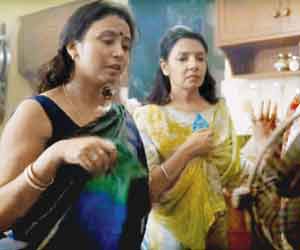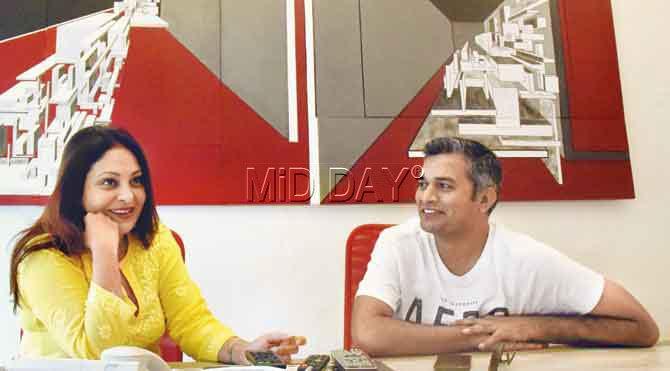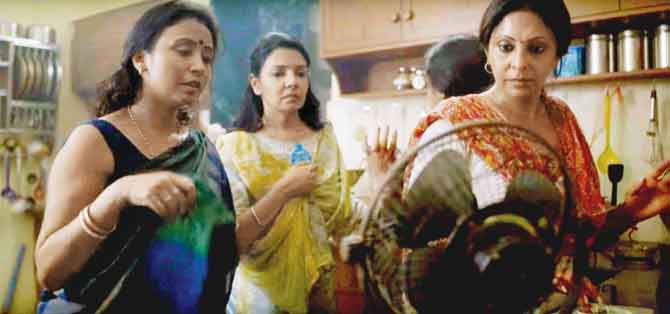Director Neeraj Ghaywan and actor Shefali Shah come together to spool a haunting tale inside an airless kitchen, in their new short film

As a child, filmmaker Neeraj Ghaywan was spoiled rotten. The youngest after three sisters, he was everyone's favourite, and his mother would never tire of reminding him. Then, he grew up, and something within him snapped. "My sisters would keep telling my nephews of how I was pampered. And, that's when I realised that this excessive affection had nothing to do with me being cute. It was because I held the privilege of being the only male child in the family," he recalls, adding, "I told them to stop narrating the stories. They were embarrassing." Somehow, he says, his mother too had internalised patriarchy without consciously meaning to.
ADVERTISEMENT

Shefali Shah and Neeraj Ghaywan. Pic/Nimesh Dave
In light of his recent 14.40-minute short film, Juice, Ghaywan's appraisal of his own childhood doesn't come as a surprise. The film, which stars Shefali Shah in the lead, takes us into a middle-class Indian home, where a small dinner party is on. The men appear to have made themselves comfortable in the drawing room, engaging in wasted conversations around politics and office gossip, while the wives squeeze into a poorly-ventilated kitchen, furiously chopping and frying, to ensure those discussions never run out of fuel. And, even as they work themselves to the bone, all these ladies crave is a fan, but they can't have one, or can they? The last scene is a vision of subtlety, but it hits the right notes, enough to have drawn over 1.3 million views since it released on YouTube a week ago. Ghaywan's layered depiction of a regular homemaker and Shah's haunting performance of the same stays with you long after the film is over.

A still from the film
Now, sitting in Shah's Andheri West office on a warm weekday afternoon, the two artistes are glad that they were able to convey their intent through this short project. The idea was to have conversations, even if it meant talking about kitchen aesthetics. "Have you realised that most Indian kitchens don't have fans, and it's not because nobody thought about it, but because our women are not important to us," says the director of the award-winning film Masaan. Shah agrees. "In a house plan, the kitchen is given the least space. It feeds and nurtures so many people, but it's a gas chamber," she says. What worked for the duo is that they are ardent admirers of each other's work. "We belong to what you may call mutual admiration society," Shah jokes. "I was floored by Shefali's performances in both Satya and most recently, Dil Dhadakne Do. I thought if she did this movie, she would bring a certain kind of championship and credibility to the film," says Ghaywan.
"But, I would have done the film irrespective because I was really waiting to work with him," says Shah. "And, when he showed me the script, it was so powerful, nuanced and then, of course my role as Manju. More than a protagonist, I see her as a voice for a lot of women. It's an important film, but I don't want to undermine it, by adding adjectives to it." Ghaywan suddenly remembers an incident from the shoot, and cuts her in. "In the last scene, all I told her was, Shefali, you are not just representing a character, but many women. It hit her so much that in every take, she'd start crying."
"It moved me," she says, "…because this is what happens in every second household, and you see it at so many levels. It may have started with my grandmother and mother, and may pass on to my sons, if I don't raise them right. Strangely, sometimes, it is the women, who hammer it in, saying to the girls, this is your job [cooking], and not the man's."
That brings us to question, as to whether Ghaywan had deliberately thought of making a feminist film. "I am not here to talk about how women should be above men. I'd like to know why is that even a debate?" he says. Shah points out that the idea of feminism carries an aggressive context. "But, this is not about one-upmanship. It's about equality of class, gender, race, religion and caste. That's a basic right, no?" Here, Ghaywan mentions how he is in fact put-off by the recent spate of women-centric films, which he claims, do little, but pander to a formula that clicks at the box office.
"In most of them, the women are either portrayed as super strong and aggressive, or vulnerable. That's one path to follow, and then there's another path, where you show a woman, who is going through issues, but you don't make it seem apparent. That's what I wanted to do with Juice. Even Manju, for that matter, is not flawless."
One of the most moving comments, Ghaywan recounts receiving recently, was on Facebook. He passes on his cellphone to show us a message written by a teenager to his mum after he watched the film, and in which Ghaywan was tagged. "Mum did you ever feel that way when working in the kitchen?" he writes, "I am sorry, if you did." His mum responded to it saying, "Mera bachcha, I am at least glad you realised." Shah begins tearing up, as soon as she reads it. "I think we've done our bit."
Catch up on all the latest Mumbai news, current affairs from Mumbai, local news, crime news and breaking headlines here
 Subscribe today by clicking the link and stay updated with the latest news!" Click here!
Subscribe today by clicking the link and stay updated with the latest news!" Click here!







